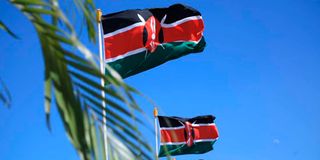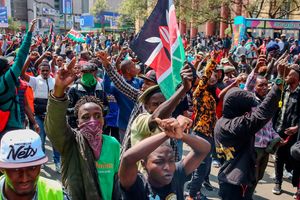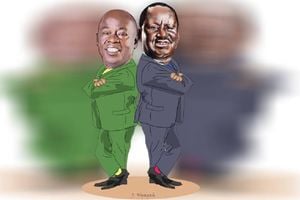
Kenya flags fly at Uhuru Gardens Park on December 11, 2021.
We have considered at some length the severity of our ethico-political predicament, and how it defines our governance, especially in respect of public and elite attitudes to the rule of law, impunity and corruption.
The elite class hunts with the hounds and runs with the hares, while the public are both brazen enablers and hapless victims of impunity and corruption.
We have seen how this confounding malaise is partly a legacy of colonialism, insofar as the state- whose core element was transmitted to majority African rule at independence - was constituted for the sole purpose of exploiting, dispossessing, repressing and enslaving the African majority, and how this fact shaped African attitudes in terms of the evolution of a moral imperative to subvert the state on one hand or align with its imperatives in exchange for certain material benefits, on the other hand.
The most intense expression of this moral schizophrenia was, of course, the popular African leadership of the freedom struggle. This is because they emerged as recognised and legitimate champions of native aspirations for sovereignty, and yet, owing to this very fact, were co-opted into the apparatus of colonial hegemony as administrators and policymakers. For that is what the Local Native Councils, Legislative Council, and colonial administration were; agencies of an illegitimate minority dominance and plunder.
Our founding elite, who would be freedom fighters and so forth, were, therefore, literally on the colonial government's payroll, and the institutional processes preparatory to self-rule, were administered under the guidance of the colonial government.
One reason why the study of history is an unpopular enterprise is that it entails undergoing the excruciating and eternal insult of being reminded that the fathers of our state included Messr. Alan Lennox-Boyd and Oliver Lyttleton, who were colonial secretaries after whom constitutions are named. Instructively, there is no record of a Jomo Kenyatta constitution or the like.
Without doubt, therefore, colonial stewardship, which was the engine of the processes leading to uhuru facilitated the seamless transition of the essential institutional features of the colonial status quo into the governance of a sovereign
When, finally, independence came, both the public and its leaders were firmly in the grasp of an insoluble paradox, not knowing whether they were coming or going. Consequently, Kenya has endured extreme political vertigo induced by spinning rapidly in an endless loop of incorrigible contradiction.
Every step forward was inevitably countermanded by a ten-fold bolt in the reverse direction. Progress was undermined by plunder and exclusion, and democracy was haunted by tribalism and virulent xenophobic propensities.
The independence constitution was vetoed by Sessional Paper No.10 of 1965 which asserted that the replication of the colonial development strategy which focused investment in the White Highlands and marginalised former native reserves, was the best expression of ‘African socialism’. In any event, that constitution was subjected to relentless efforts to fashion an effective despotic charter bearing the institutional mechanisms of an African autocracy with perverse feudal characteristics.
Likewise, the enactment of the Prevention of Corruption Act was swiftly followed by a malevolent misinterpretation of the recommendations of the Ndegwa Commission report, to institute an official free-for-all regime of elite impunity. In institutional terms, Kenya was booby-trapped to eschew progress on the pain of implosion. With hindsight, Nyayo's irrepressible neurosis about multi-party democracy spawning ethnic conflict and state collapse was informed by an eye-witness appreciation of the evolution, causes, nature and purposes of the Kenyan state.
Progress, stability, peace, and cohesion – the very stuff of nationhood - required us to extirpate the inherited institutions of the colonial state and substitute them with a truly autochthonous, sovereign, egalitarian, inclusive and democratic regime. The reason why such a straightforward process of retiring superficial independence took nearly half a century of blood, sweat and tears should now be plainly obvious.
It is also why the constitution of Kenya 2010 is first and foremost a decolonising charter; it opened the door for us to experience and contribute to real democracy, development, freedom and security by first dismantling chronic barriers to authentic sovereignty, recognising the people as the exclusive owners of sovereign power and leaders as their servants, redefining the state as the agency of the people's interests and instrument of the collective good, and clearly assigning to the state the fundamental and essential obligation to recognise, protect, uphold and enhance the fundamental rights and freedoms of the citizen.
It is no longer feasible or sustainable for the state to represent or enforce interests contrary to the people's wishes. Nor is it politically sustainable for the elite to pursue agendas that run afoul of the salus populi without plunging headlong into the precipitous abyss of political suicide. Article 10 of the constitution is, in a word, the vital substrate which defines Kenya's decolonising institutional agenda, and projects our true elemental character as a res publicus: an entity of the people, from which we derived our formal name as the Republic of Kenya.
Mr Ngéno is an Advocate of the High Court










